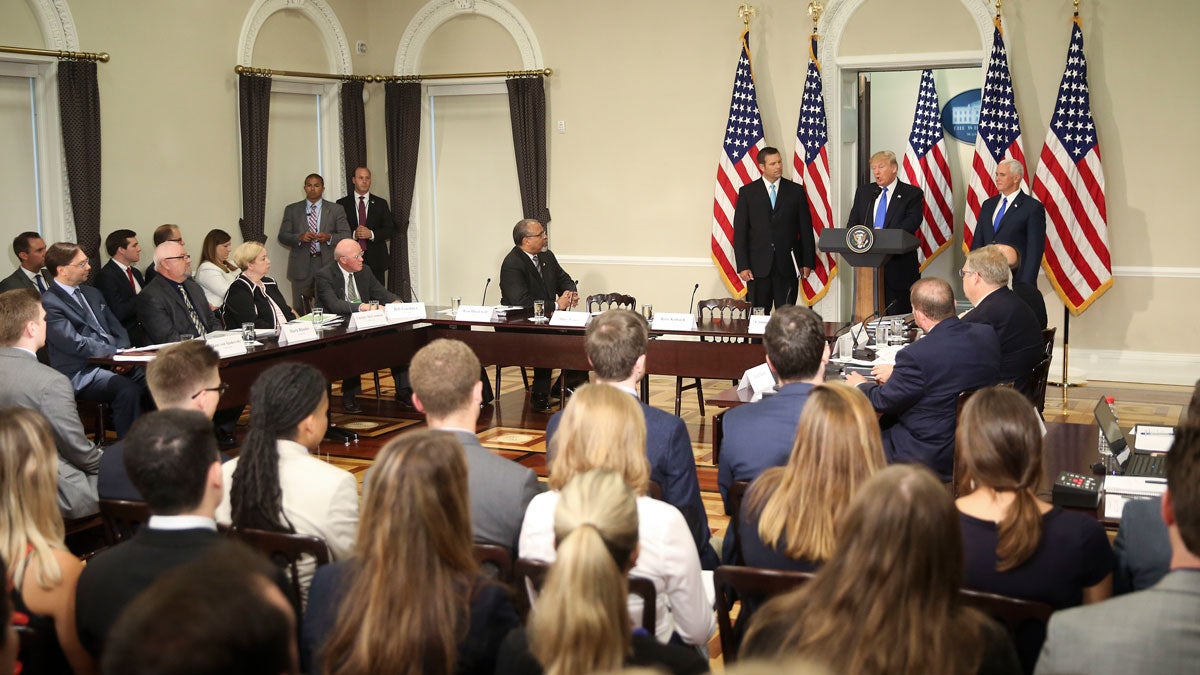Voters suspicious of sharing data as Trump commission gets to work
Listen
President Donald Trump, with Kansas Secretary of State Kris Kobach and Vice President Mike Pence, right, speaks at a meeting of the Presidential Advisory Commission on Election Integrity, Wednesday, July 19, 2017. (AP Photo/Pablo Martinez Monsivais)
President Donald Trump’s commission on voter fraud met for the first time Wednesday, and if it’s done one thing, it’s gotten a lot people feeling more protective about their voter records.
“It is none of your business or the president’s how I vote, for whom I vote, and whether I vote,” Anthony Hughes wrote in an email to Kris Kobach, the Kansas secretary of state and vice chair of the commission.
The commission invited feedback from citizens and published the emails on its website. The overwhelming majority are harshly critical — many profane, and some quite funny.
“Hi. I voted in all 50 states. Just wanted you to know,” one wrote.
You may recall that the commission asked states for detailed information on voters — including the last four digits of their Social Security numbers — and said it would make the information public. Most states have refused, citing privacy concerns.
But the commission will be getting voter files from states, public records that include a lot of information about voters — addresses, birth dates, party changes and elections voted in.
And some people are antsy about that.
Wanda Murren, press secretary for the Pennsylvania Department of State, said its elections office “is getting a lot of calls [Wednesday] from people asking how they can cancel their registration. Also, a couple of county offices have been in touch with us, describing the same thing.”
The voter fileWhen Pennsylvania Gov. Tom Wolf wrote the commission rejecting its request, he noted that the commission — or anyone — can purchase the state’s voter file for $20.
I decided to see just how easy it is to get the file and use it. A visit to the state’s website with my credit card got me a download in minutes.
There’s a lot of information about the state’s 8 million voters, but if you think anyone can just download the file and start looking up names, think again.
The first thing you discover is that the voter file is actually 268 separate files — four for each of the state’s 67 counties. They’re text files, so you have to convert the information to some spreadsheet software like Excel, and you can only do one county at a time.
The county files that have the voter data come without column headers, so it’s not clear what the data are, until you import information from other files.
With time, effort and a little help from colleagues, I managed to get a workable file of Philadelphia’s 1 million registered voters. So now I can check on my friends and, in theory, do some deep analysis of voting trends.
Al Schmidt, co-chair of the Philadelphia City Commissioners office, which oversees elections, does a fair amount of that with the Philadelphia data.
“We dig into that data to try to get a closer look at voter behavior,” Schmidt told me. His staff did an analysis of the recent district attorney/city controller primary and found a big increase in millennials voting, for example.
Schmidt said the city and state do have partial Social Security and driver’s license numbers in their databases.
They’re never released to the public, but he said they help distinguish people who may have the same name if there’s a question of duplicate registrations, for example.
Schmidt also uses that information to investigate vote fraud. His office has referred nine cases for prosecution in the past several years and gotten eight guilty pleas. He said there are a few cases and they always involve small numbers of votes.
“When we’ve seen it, we’re talking about races that are very local and can be determined or influenced by handfuls of votes,” he said.
The pros
The people who really work public voter files deeply are political professionals.
I sat down with Democratic strategist Mark Nevins, and he showed me how he uses a service called Catalist that takes voter rolls and integrates them with other commercially available information on race, religion, union affiliation, even consumer habits.
“They’ve taken this data, and they’ve profiled the people who are likely to fit one category or another,” he said. “Are they likely, for example, to be a pro-choice voter? Are they likely to support health care reform? Are they likely to support gun-safety legislation?”
Nevins showed me an exercise in which he did research for an imaginary Democratic candidate for a local congressional district, and got finely crafted lists of tens of thousands of voters who might be targeted for specific messages.
How much fraud?
Al Schmidt has spent years observing elections in Philadelphia, a city with a reputation for Election Day mischief, and has observed widely scattered, small-scale fraud.
I asked Schmidt, a Republican, what he thought of Trump’s claim that 3 million people voted illegally last year.
“That would be an astonishing number,” he said. “I’d be interested in seeing where that number comes from, what basis in fact it’s grounded in.”
The president’s commission is chartered to work for two years on election integrity. We’ll see what they come up with.
WHYY is your source for fact-based, in-depth journalism and information. As a nonprofit organization, we rely on financial support from readers like you. Please give today.


